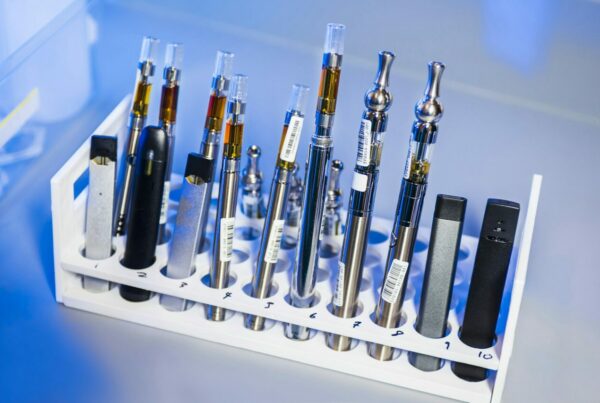N, N-Dimethyltryptamine (DMT) is a naturally occurring compound in both plants and animals, known for its powerful, yet brief psychedelic effects when ingested.
Emerging evidence suggests that DMT, which is naturally produced by the body, plays crucial roles in both the peripheral and central nervous systems, possibly functioning as a neurotransmitter.
DMT is capable of inducing strong psychedelic effects. However, it typically doesn’t result in many unfavorable outcomes, except for potential cardiovascular issues when administered in high doses via injection.
Let’s explore DMT and its various functions, ranging from its use for recreational purposes to its intriguing potential in scientific research and therapeutic applications.

A Brief Introduction to DMT: What is it?
| Attribute | Information |
| Name | N, N-Dimethyltryptamine (DMT) |
| Classification | Indole alkaloid |
| Occurrence | Naturally found in various plants and animals |
| Psychoactive Effects | Brief, intense psychedelic experiences upon consumption. |
| Method of Consumption | Can be smoked, injected, or ingested orally. |
| Duration of Effects | Effect duration is short, typically between 5 to 30 minutes. |
| Chemical Structure | Comprises a tryptamine core with two methyl groups attached to the amine nitrogen atom. |
| Metabolism | Rapidly metabolized by the body, broken down by monoamine oxidase (MAO). |
| Cultural Use | Historically used in various ceremonial and shamanic rituals by indigenous cultures. |
| Other names | Dimitri, Fantasia, Businessman’s trip, Businessman’s special, 45-minute psychosis, Spiritual molecule |
The Role of DMT in Mental Health
N, N-Dimethyltryptamine (DMT), a compound known for its potent psychedelic effects, is gaining attention for its potential impact on mental health. Despite its common association with intense visionary experiences, recent research suggests a connection between DMT and mental well-being.
Effect on Psychological and Emotional Enhancing Well-being
DMT’s psychedelic effects are renowned for eliciting deep emotional reactions and altering states of consciousness. This has the potential to pave the way for innovative therapeutic approaches to mental health issues, aid in emotional processing, and offer new perspectives on personal traumas.
Impact on Neuroplasticity and Brain Function
Research suggests that DMT could influence neuroplasticity, enhancing the brain’s ability to adapt and reorganize. Investigating its impact on synaptic plasticity and neural connectivity may lead to potential treatments for conditions linked to neural maladaptation.
Potential Therapeutic Applications for Mental Health Disorders
Early research underscores the potential of DMT in treating disorders such as depression, addiction, and PTSD. Its ability to stimulate mystical or spiritual experiences could offer an innovative approach to psychotherapy and aid in reconfiguring negative thought processes.
Examining the natural presence of DMT within the body underscores its significance in mental health resilience, stress management, and overall psychological well-being. Understanding how the body regulates internal DMT levels could guide the development of new therapeutic strategies.
DMT’s Role in Mental Health Disorders
| Mental Health Disorder | Description | DMT’s Potential | Benefits |
| Depression | This mood disorder is marked by persistent sadness, lack of interest, and decreased motivation | Preliminary research suggests DMT could relieve symptoms by stimulating deeply emotional experiences | Its rapid onset and potential to spark transformative experiences may offer innovative therapeutic approaches for reforming negative thought processes and enhancing emotional processing |
| Post-Traumatic Stress Disorder (PTSD) | This mental health disorder, triggered by traumatic events, leads to flashbacks, intense anxiety, and intrusive thoughts | Early studies indicate DMT’s potential to control symptoms by stimulating spiritual or mystical experiences, aiding patients in reshaping traumatic memories | DMT’s ability to stimulate altered states of consciousness could assist in emotional processing and provide a fresh perspective on traumatic experiences |
| Addiction | A complex disorder characterized by compulsive engagement in rewarding stimuli, regardless of detrimental consequences | Some research suggests that DMT could disrupt addictive patterns and reduce substance cravings | DMT’s ability to induce intense and transformative experiences could help individuals alter their behavioural patterns and address the underlying reasons for their substance dependence |
Approaches to Utilizing DMT
DMT, renowned for triggering short but intense psychedelic trips, can be employed via several methods. The choice of administration is often dictated by the desired intensity and duration of the experience.
Inhalation:
When inhaled through a pipe or vaporizer, DMT requires careful temperature control to avoid overheating and scorching the compound. The psychedelic experience begins almost instantly upon inhalation of DMT, typically lasting between 5 to 15 minutes.
Oral Consumption:
Consuming DMT orally induces effects that start more gradually but can last several hours due to the slower metabolism of DMT in conjunction with an MAOI.
Injection:
DMT can be injected directly into the bloodstream for rapid and intense effects.
This approach results in a swift and powerful experience, but it demands precise dosage and carries increased risks.
Insufflation (Snorting):
Insufflating DMT results in a slower onset of effects compared to inhalation but may foster a more prolonged experience.
Sublingual or Buccal Administration:
When absorbed through the oral mucosa, this method provides an alternative to inhalation and delivers a longer, though less intense, experience.
Determining Therapeutic Dosage: N, N-Dimethyltryptamine (DMT)
The recommended dosage for inhalation lies between 20 to 40 mg, while for intravenous administration, the suggested dosage is 0.2 to 0.4 mg per kg of body weight. These dosage guidelines are particularly relevant for clinical research and are chiefly pertinent to intravenous use.
- Higher doses administered intravenously are associated with intense visuals, temporary loss of control, and a combined state of anxiety and euphoria
- Interestingly, less desirable effects have been observed with lower doses
- Recreational doses of inhaled DMT generally vary from 40 to 50 mg, occasionally escalating to up to 100 mg
- Different doses of intravenous HTML:
- People have reported lasting improvements in psychological well-being from near-death experiences associated with DMT (7, 14, 18, and 20 mg solutions).
Availability of DMT
Osmosis – 4-ACO-DMT Ethereal Essence Tincture
This tincture, marketed to contain 4-Acetoxy-N, N-dimethyltryptamine (4-AcO-DMT), a DMT variant, is a liquid extract for oral use, offering a unique experience compared to regular DMT.
Lucid Supply Co. – 5-MeO DMT Vaporizer
The product is a vaporizer delivering 5-Methoxy-N, N-dimethyltryptamine (5-MeO-DMT), a potent substance known for its transformative, brief experiences.
Integral Alchemist – Acacia – 1ml DMT Vape Cartridge
This DMT vape cartridge by Integral Alchemist comes pre-loaded with N, N-Dimethyltryptamine and is designed for those who prefer a convenient, discrete way to consume DMT.
Deadhead Chemist – 5-Meo-DMT Cartridge
This cartridge houses 5-Methoxy-N, N-dimethyltryptamine (5-MeO-DMT), a substance known for its deep and powerful effects.
Mental health benefits may be associated with personal growth, spiritual experiences, or therapeutic uses aimed at improving emotional well-being.
Deadhead Chemist – N, N DMT Cartridge
Another offering from Deadhead Chemist, this cartridge is filled with standard N, N-Dimethyltryptamine. Cartridges provide a simple and consistent way of ingesting DMT.
Concluding Thoughts
The application of N, N-Dimethyltryptamine (DMT) in
How can I safely explore DMT products?
By turning to trusted sources like 3 Amigos Canada Online Dispensary, you can receive guidance and a variety of options, allowing you to explore DMT products responsibly.
Frequently Asked Questions:
How do different DMT products affect mental health?
Vaporizers, for instance, tend to provide swift effects, whereas tinctures or vape cartridges provide more controlled and consistent doses.
Using derivative compounds like 5-MeO-DMT can result in varying degrees of intensity and diverse impacts on mental health.
These nuanced differences underscore the importance of selecting a DMT product that aligns with your personal preferences and mental health goals.
Can DMT lead to lasting changes in mental health and personal growth?
Anecdotal evidence suggests that DMT-induced experiences can have long-term effects on mental health and personal development.
Profound or transformative experiences, such as those resembling near-death experiences, are often associated with continuous positive changes in psychological health and personal development.
Although these experiences are intense and brief, they frequently provoke self-reflection, spiritual revelations, and a sense of unity or enlightenment.
Many individuals report a refreshed perspective on life, enhanced emotional resilience, and a greater appreciation for life after having these experiences.
What’s the most effective way to utilize DMT for mental health benefits?
It’s crucial to make informed decisions, which includes thorough research and understanding the effects of the compound.
Advice from mental health professionals or experienced users can provide valuable insights into potential risks and rewards.
It’s also important to understand your personal tolerance and mental preparedness, and to ensure a supportive and safe environment for the experience.
DMT stands out from other psychedelics such as psilocybin or LSD in terms of its effects, duration, and intensity. Notably, DMT’s effects are brief.
Short-acting, high-intensity psychedelics like DMT necessitate unique therapeutic strategies in mental health therapy, different from those applied for psychedelics with longer-lasting effects.
Recommended Additional Reading:





